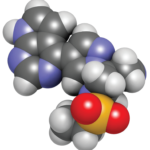 On Sept. 1, the U.S. Food & Drug Administration (FDA) announced that it is requiring revisions to the Boxed Warning for the Janus kinase (JAK) inhibitors Xeljanz/Xeljanz XR (tofacitinib), Olumiant (baricitinib) and Rinvoq (upadacitinib) to include information about the risks of serious heart-related events, cancer, blood clots and death.1
On Sept. 1, the U.S. Food & Drug Administration (FDA) announced that it is requiring revisions to the Boxed Warning for the Janus kinase (JAK) inhibitors Xeljanz/Xeljanz XR (tofacitinib), Olumiant (baricitinib) and Rinvoq (upadacitinib) to include information about the risks of serious heart-related events, cancer, blood clots and death.1
Recommendations for healthcare professionals will include consideration of the benefits and risks for individual patients prior to initiating or continuing therapy. In addition, to ensure the benefits of a JAK inhibitor outweigh the risks in patients who receive them, the FDA is limiting all approved uses to certain patients who have not responded to or cannot tolerate one or more tumor necrosis factor (TNF) blockers.
Changes will also be made to several sections of the prescribing information and to the patient medication guide.
The Great Debate at ACR Convergence 2020 focused on the question, “Should Jakinibs Be Used Before Biologics after Methotrexate Failure in RA?” It seems the FDA has now answered that question for rheumatologists.
The Basis
Based on a completed review of a large randomized safety clinical trial, the FDA concluded tofacitinib carry an increased risk of serious heart-related events, such as heart attack or stroke, cancer, blood clots and death.1 This trial compared tofacitinib with TNF blockers in patients with rheumatoid arthritis (RA). The trial’s final results also showed an increased risk of blood clots and death with the lower dose of tofacitinib. A prior Drug Safety Communication, based on earlier results from this trial, reported an increased risk of blood clots and death only seen at the higher dose.2
When tofacitinib was first approved, the FDA required the manufacturer, Pfizer, to conduct a randomized safety clinical trial in patients with RA who were taking methotrexate to evaluate the risk of cardiovascular events, malignancy and infections. According to the FDA report, the study was a multi-center, randomized, open-label trial to evaluate two doses of tofacitinib (5 mg twice daily [N=1455], which is the approved dosage for RA, and a higher 10 mg twice daily dosage [N=1456]) in comparison to treatment with a TNF blocker (N=1451).1 Patients in the trial were required to be 50 years of age or older and have at least one cardiovascular risk factor. The co-primary endpoints were major adverse cardiovascular events (MACE), defined as cardiovascular death, nonfatal myocardial infarction, and nonfatal stroke; and malignancy, excluding nonmelanoma skin cancer (NMSC). The trial was designed to exclude a prespecified risk margin of 1.8 for the hazard ratio of combined tofacitinib regimens when compared with the TNF blocker control for each co-primary endpoint. The median on-study follow-up time was four years.
The mean age of the population was 61 years, and the median age was 60 (range 50–88 years). Most patients were female (78%) and white (77%). The noninferiority criterion was not met for the comparison of the combined tofacitinib regimens to TNF blockers for the endpoints of MACE and malignancies because the upper limit of the 95% confidence intervals (CI) for these hazard ratios exceeded the prespecified noninferiority criterion of 1.8. For MACE, the estimated hazard ratio and 95% CI associated with the combined tofacitinib regimens relative to TNF blockers were 1.33 (0.91, 1.94). For malignancies excluding NMSC, the estimated hazard ratio and 95% CI associated with the combined tofacitinib regimens relative to TNF blockers were 1.48 (1.04, 2.09).
There was an increased risk of death, MACE, malignancies and thrombosis associated with both regimens of tofacitinib. The data showed evidence of a dose-dependent increased risk for MACE, all-cause mortality, and thrombosis at both doses of tofacitinib when compared with treatment with TNF blockers. Additionally, the data showed evidence of a non-dose-dependent increased risk for malignancy excluding NMSC at both doses of tofacitinib when compared with TNF blockers. Lymphomas and lung cancers were observed at a higher rate in patients treated at both doses of tofacitinib compared with those treated with TNF blockers. In particular, a higher rate of lung cancers was observed in current or past smokers treated with tofacitinib. Current or past smokers had an additional increased risk of overall cancers.
The FDA is also requiring new and updated warnings for two other JAK inhibitors, baricitinib and upadacitinib. Baricitinib and upadacitinib have not been studied in trials similar to the large safety clinical trial with tofacitinib, so the risks have not been adequately evaluated. However, because they share mechanisms of action with tofacitinib, the FDA considers that these medicines may have similar risks as seen in the tofacitinib safety trial.
Note: Two other JAK inhibitors, Jakafi (ruxolitinib) and Inrebic (fedratinib), are not indicated for the treatment of arthritis and other inflammatory conditions and so are not a part of the updates currently being required.
Impact
Ethan Craig, MD, MHS, an assistant professor of clinical medicine with the Division of Rheumatology at the University of Pennsylvania, Philadelphia, a rheumatologist at the Corporal Michael J. Crescenz VA Medical Center and an associate editor of The Rheumatologist, says he doesn’t think this decision will have much of a clinical impact on practices because many insurance plans already require a TNF first approach to treatment. “For most indications, JAK inhibitors as second line to TNF inhibitors is probably appropriate based on data we have at this point. Although this may not change my habits considerably, this is a big deal,” he says.
The impact on patients and the administrative burden on practices will likely increase, says Victoria Ruffing, RN-BC, the director of patient education at the Johns Hopkins Arthritis Center, Baltimore, adjunct faculty at the Johns Hopkins School of Nursing and an associate editor of The Rheumatologist. “I foresee even greater challenges for prior authorizations. Insurance companies will likely try to force the use of two TNFs before agreeing to a JAK inhibitor,” she says. “Also, many patients are going to be hesitant to start JAK inhibitors when they hear about this.”
References
- FDA requires warnings about increased risk of serious heart-related events, cancer, blood clots, and death for JAK inhibitors that treat certain chronic inflammatory conditions. U.S. Food & Drug Administration. Drug Safety Communication. 2021 Sep 1.
- FDA approves Boxed Warning about increased risk of blood clots and death with higher dose of arthritis and ulcerative colitis medicine tofacitinib (Xeljanz, Xeljanz XR). U.S. Food & Drug Administration. Drug Safety Communication. 2019 Jul 26.


